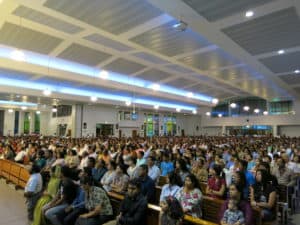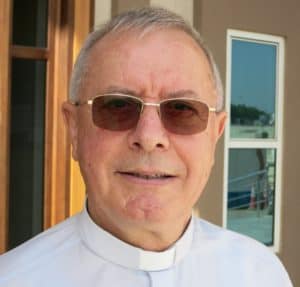Bishop in United Arab Emirates: ‘I have never experienced animosity’
Bishop Paul Hinder is Apostolic Vicar for southern Arabia. The Swiss Capuchin monk will host the Pope when he sets out for Abu Dhabi in the United Arab Emirates (UAE) Feb.3, 2019. Aid to the Church in Need spoke with the bishop about tolerance in everyday life, the lack of religious freedom and expectations for the papal visit.
Pope Francis will soon be visiting Abu Dhabi. Would it be an exaggeration to speak of a historic visit?
No. The visit can be called historic for two reasons in particular: first of all, this will be the first time in Church history that a pope will visit the Arab Peninsula. Second of all, it will be the first time that the Eucharist will be celebrated on public property that the government has placed at our disposal.

You are expecting more than 130,000 faithful, who will openly come together for the papal Mass. That would be inconceivable in neighboring Saudi Arabia. There aren’t even churches there. Why are things different in the United Arab Emirates?
How much freedom of worship is granted, that is, the possibility of celebrating divine services as a congregation, varies in each of the countries of the Arab world. While in Saudi Arabia divine services are only tolerated when held in private, and in relatively small groups, in other countries, particularly here in the UAE, churches have been built and are visited by thousands of worshipers each week. This freedom usually depends upon the openness and tolerance of the respective rulers. Over the last few decades, an openness and tolerance could be found particularly in Bahrain, UAE, as well as Oman.
So the rulers of the United Arab Emirates have a relatively open attitude toward Christianity. Is this attitude shared by the general population?
I have been living in Abu Dhabi for the last 15 years and have never experienced any animosity. Of course, we know that in all Islamic countries, non-Muslims—not only Christians—have to comply with the social laws of Islam. On the other hand, I see a deep respect for Christians among the local population. This is even more apparent now in the run-up to the papal visit. A number of Muslims have contacted me to ask how they can help prepare for the visit. Many have expressed an interest in attending the Mass. The government is also doing everything in its power to ensure that as many of our faithful as possible will be able to see the Pope.
The Church in the Emirates is made up of only foreigners, in particular foreign workers. What kind of problems do you face as bishop ministering to this flock?
One of the critical pastoral problems lies in the challenge to strengthen our people in their faith and encouraging them to bravely retain their Christian and Catholic identity—to profess to the faith even in an environment that does not always make this easy. I am thinking about the domestic workers and construction workers who not only have to work hard each day, but sometimes also have to deal with the missionary zeal of Muslim employers or colleagues.

Bishop Paul Hinder
What happens when a local Muslim wants to convert to Christianity?
I am not aware of any Muslim country that allows full religious freedom. Even in those where converting a Muslim to another religion is not punishable by law, at the very least the person’s social circle, in particular his or her family, will react with ostracism or even physical violence. As I said already, freedom of religion is greater or lesser depending upon the country.
Do you have enough churches and priests?
More churches would be desirable, as the number of our parishes is still not commensurate with the number of believers. In the UAE, for example, we have nine parishes, which is definitely not enough for the almost one million Catholics living in the country. Furthermore, it also needs to be taken into consideration that, in contrast to the other Churches, our members are international, speak different languages and follow different Catholic rites. A further pastoral challenge arises from the fact that, due to their situations as migrants, many of our faithful are facing challenging moral issues. This is particularly common among those men and women who live apart from their spouses because of work, often for periods longer than a year. It is not uncommon for marriages to break up when workers begin new, “temporary” relationships.
How can the papal visit help to improve the situation of Christians in the Islamic world?
I hope that the visit of the Pope will be able to change the overall mood for the better. However, it would be a mistake to expect too many miracles from this kind of visit. The decisive thing is that we Christians are credible witnesses of the message of Christ. And that also means accepting with humility that we will never play first fiddle in this society. Even if all that is achieved is greater mutual respect and this makes it possible to work together in problem areas that affect all the religions, then progress has been made. You only need to think about the challenges in the commitment to peace or in the care for our common home of creation.
—Oliver Maksan

